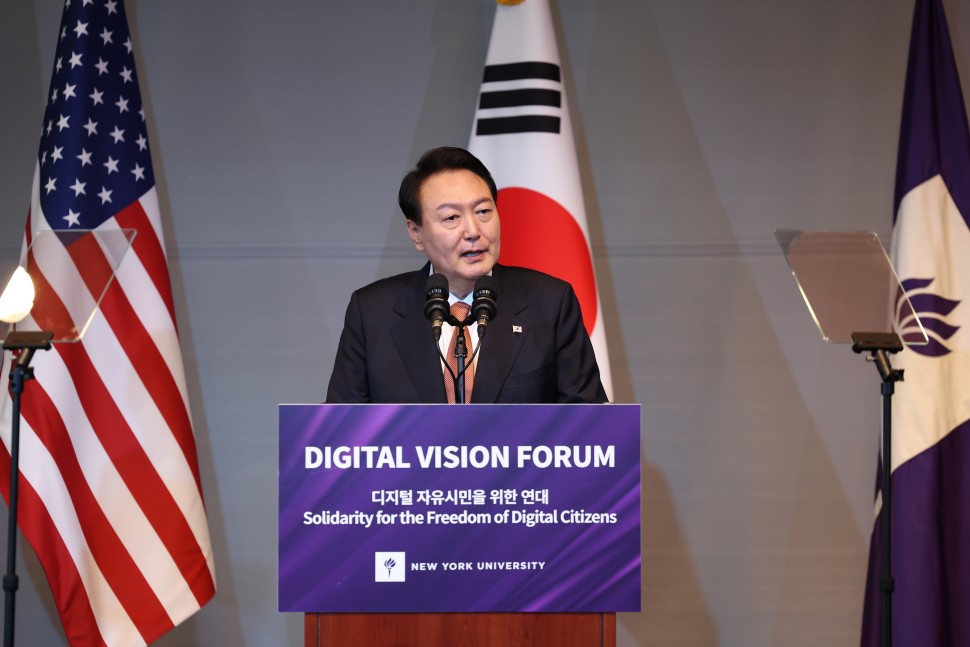[Oct] Korea aims to be among digital era leaders
Date Oct 21, 2022
 President Yoon Suk Yeol announces his vision to develop Korea’s digital technologies at New York University’s Digital Vision Forum on September 21. (Courtesy of the Office of the President)
President Yoon Suk Yeol announces his vision to develop Korea’s digital technologies at New York University’s Digital Vision Forum on September 21. (Courtesy of the Office of the President)
With the digital transformation of the world picking up pace, Korea – already a country well known for nurturing digital-related industries – aims to move closer to the forefront of the nations that are driving the digital era.
On September 28, the Ministry of Science and ICT announced a goal of passing the (tentatively named) Digital Society Framework Act of 2023 to improve public accessibility to digital technology and foster related social infrastructure.
Through the Act, the government seeks to employ digital technology to innovate welfare and administrative services and create a society where everyone can enjoy the benefits of technology.
The plan to enhance the competitiveness of the country’s digital technology follows President Yoon Suk Yeol’s vision that digital technologies should contribute to expanding freedom. “The digital ecosystem should not be dominated by certain classes, and support should be provided to prevent the polarization caused by digital gaps and increase digital accessibility and convenience,” President Yoon said at the Digital Vision Forum held at New York University on September 21. He delivered the event’s keynote speech on the sidelines of his visit to the United States to attend the U.N. General Assembly.
“We also need to operate systematic education programs that can help future generations grow into ‘digital natives,’” the president added.
Under the president’s New York initiative, the government will focus on digital innovation in all areas, including technology, manpower, multiple industries, culture and the public sector.
In order to secure the world’s best digital capabilities, Korea will foster over 1 million workers for the digital technology sector, launch a pre-sixth-generation (pre-6G) network system by 2026 and nurture the digital platform industry.
In addition, the government plans to make the most of digital technology when it comes to strengthening the competitiveness of the service industry, advancing the manufacturing industry and finding new growth engines for businesses linked to agriculture, livestock and fisheries.
To create a digital technology-based society with diversity and inclusion, the country will establish a meticulous safety system that digitally protects the people as they go about their daily lives.
Digital technologies will also be employed to solve climate change issues. Using artificial intelligence (AI) technology, the government will promote eco-friendly data centers and improve the efficiency of energy production and consumption.
From 2023, five major Korean cities will be designated digital innovation hubs. Digital infrastructure and research facilities will be clustered in them to foster regional economic growth.
With these plans, the government expects to address various difficulties the country is facing, such as the intensifying competition for global hegemony, low growth, economic polarization and climate change.
“Digital competitiveness is directly related to a nation’s capabilities, and digital technology has become an important means to improve the structure of the economy and industries, create jobs and solve social problems,” said Second Vice Minister of Science and ICT Park Yun-kyu, while introducing the government’s digital strategy at the September 28 briefing.
**If you have any questions about this article, feel free to contact us at kocis@korea.kr.**

The Ministry of Culture, Sports and Tourism's "Korea Here & Now" work can be used under the condition of "Public Nuri Type 1 (Source Indication)."




